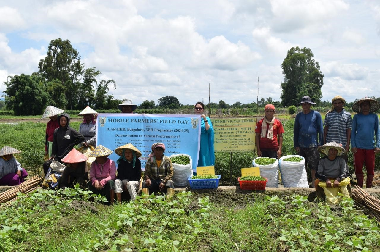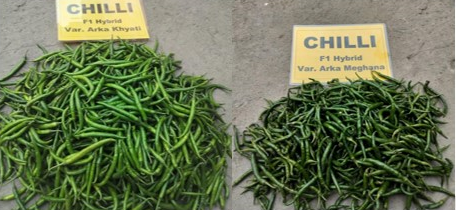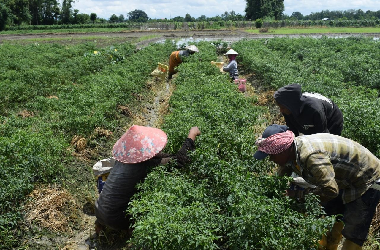Chilli is one of the most important spice crops in Bishnupur district and across Manipur, cultivated almost year-round as a commercial crop. Green chilli is a staple in Manipuri cuisine an essential ingredient in daily meals, salads, and chutneys making its cultivation a major source of income for local farmers.

Traditionally, farmers in Bishnupur cultivate various F1 hybrids and local landraces of chilli, which vary widely in pungency, yield, and adaptability. To evaluate and promote improved chilli varieties with higher productivity and resilience, ICAR–Indian Institute of Horticultural Research (IIHR), Bengaluru, under its NEH Component, provided seeds of ‘Arka Khyati’ and ‘Arka Meghana’ to farmers through Krishi Vigyan Kendra (KVK), Bishnupur, Manipur. The initiative aimed to popularize high-yielding chilli varieties, enhance farmers’ income, and promote sustainable vegetable production in the region.
To demonstrate the performance of the varieties, field trials were conducted in five villages—Khoijuman, Bishnupur Ward No.11 (Ngaikhong), Saiton, Kumbi, Leimaram, and Kabowakching. Ten farmers were selected for the demonstration, each receiving 20 g of seeds. The program was implemented under the technical guidance of the Subject Matter Specialist (Horticulture), KVK Bishnupur, following the recommended package of practices.
Technical details of the intervention:
• Seed rate: 500 g/ha
• Spacing: 60 cm × 45 cm
• FYM: 5 tonnes/ha
• NPK: 120:50:50 kg/ha
Seeds were sown on raised beds, and transplanting was carried out between November 2024 and February 2025 after land preparation. One-third of nitrogen, along with the full dose of phosphorus and potassium, was applied as basal fertilizer. The remaining nitrogen was top-dressed in two equal splits at 50 and 75 days after transplanting (DAT). Each farmer cultivated the crop over 625 m², using life-saving irrigation due to limited water availability.

The demonstration generated strong interest among both participating and neighboring farmers. The varieties exhibited vigorous growth and impressive yield performance despite water constraints.
•50% flowering was recorded at 46 DAT for Arka Khyati and 57 DAT for Arka Meghana.
•First picking occurred at 70 DAT for Arka Khyati and 83 DAT for Arka Meghana.
•Harvesting continued for 4–5 months, with both varieties showing good drought tolerance.
Farmers preferred Arka Khyati for its short duration and early yield, while Arka Meghana was appreciated for its fruit quality and consistent performance. Encouraged by these results, several farmers have prepared to raise Arka chilli seedlings under the NEH program for 2025–26, indicating growing adoption of improved varieties for higher productivity and profitability.
The success of the demonstration was widely recognized. The harvested fruits of Arka Khyati were showcased during the Viksit Krishi Sankalp Abhiyan (VKSA) campaign (29 May–12 June 2025) at Bishnupur Ward No.11 and Khoijuman.

A Mobile Farmers’ Field Day was organized on 3 July 2025 at Khoijuman village, where 35 farmers observed the fruiting stage and interacted on varietal performance. The program exemplified the principle of “Seeing is Believing,” reinforcing the value of on-field demonstrations as an effective extension tool.
Positive feedback was received from participants, and the success story shared by Bishnupur farmers on social media attracted interest from farmers in Imphal East district, who expressed their willingness to obtain seeds of these varieties.
The field performance and economic returns from Arka Khyati and Arka Meghana convinced farmers to shift from high-cost hybrid seeds to these improved varieties. The adoption of Arka varieties is expected to significantly enhance farmers’ income, reduce input costs, and contribute to sustainable chilli production in Bishnupur district.

This successful intervention under the ICAR–IIHR NEH Component demonstrates how technology-led varietal improvement, combined with effective field demonstrations and farmer engagement, can transform local farming systems and improve livelihoods in the North Eastern Region.
(Source: ICAR-Krishi Vigyan Kendra, Bishnupur district, Manipur)








Like on Facebook
Subscribe on Youtube
Follow on X X
Like on instagram